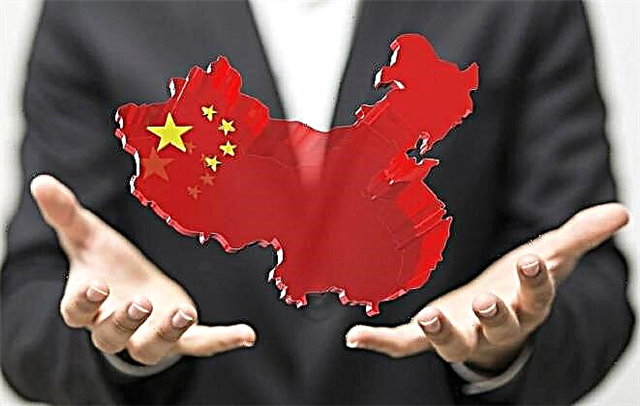The growth of the world economy has been slowing down for several years, and the IMF's forecasts for the next decade do not promise a dramatic improvement in the situation. But even against the backdrop of disappointing analytics in China, the rate of GDP growth continues to be in the top ten, although it dropped to 6.6% in 2021. All this gives investors reason to believe that doing business in China can be promising and profitable, especially if the specifics of the country are properly taken into account.

Normative base
The PRC still does not have a full-fledged code that unites the entire spectrum of civil legislation. Therefore, the issues of doing business by Chinese firms and representative offices with foreign capital are regulated by several separate regulations:
- Companies Law - 中华人民共和国 公司法;
- The Rules for the Registration of Business Entities - 中华人民共和国 企业 法人 登记 管理 条例;
- Sino-Foreign Joint Venture Law - 中华人民共和国 中外合资 经营 企业 法;
- The general part of civil law is 中华人民共和国 民法 通则 全文.
Enterprises with overseas roots in March 2021 received a new law - 中华人民共和国 外ր 投资 法, which will enter into force on January 1, 2021. For companies created before this date, the previous law - 中华人民共和国 外资企业 法 of 1986 will remain in effect for another 5 years.
The procedure for registering representative offices of foreign companies is described in the Regulations 外国 企业 常驻 代表 机构 登记 管理 条例.
Current organizational and legal forms
In the Law of the People's Republic of China "On Companies", two forms of registration of a legal entity are suitable for foreigners: a limited liability company and a joint stock company. A company created by one person stands out as a separate subspecies.
| Legal form | Specifications | Normative base |
|---|---|---|
| OOO (有限 责任 公司) | The number of founders should not exceed 50 persons. Dividends are distributed in proportion to the paid contribution to the authorized capital (the size of the share is indicated in a special register) | Chapter II of the Companies Law |
| One Founder Society (一 人 有限公司) | The minimum charter size is 100,000 RMB. By law, is responsible for obligations within the property of the company. In cases where the founder cannot unequivocally prove the ownership of the property, debt recovery can be carried out at the expense of personal assets. | Section III of Chapter II of the Companies Law |
| Joint Stock Company (股份有限公司) | There must be more than two founders (individuals or legal entities). Moreover, each of the shareholders can consist of no more than 200 participants. At least half of the co-founders are required to have Chinese citizenship or resident status in the PRC. | Chapter IV of the Companies Law |
Since 2021, the Chinese government has abolished the mandatory requirement for declaring and verifying the deposit of the minimum share capital for national companies, leaving it only for certain types of activities and foreign economic entities.
For those thinking about how to start a business in China in 2021, you need to know that the work of investors from abroad is regulated in accordance with the Sino-Foreign Enterprise Law, which expires on December 31, 2021.
| Name | Chinese Name / Pinyin Sound | a brief description of |
|---|---|---|
| A company with 100% foreign capital (Wholly Foreign-Owned Enterprise, WFOE) | 外com 独资 企业 / Wàishāng dúzī qǐyè | Unlike a foreign representative office, it has the right to conduct full-fledged commercial activities in the form of an LLC with one or more founders. The company must declare and within 2 years form an impressive authorized capital (at least 100,000 yuan). Has no right to engage in certain types of business, such as opening a media outlet or mining. |
| Joint Venture (JV) | 合资 / Hézī | Parity partnership with Chinese co-founders opens up industries that are not available to WFOEs. Joint work can be organized in the form of JSC or in the form of a contract for the conduct of activities and profit sharing with partners. The procedure and procedure for opening a Chinese business, registering and paying for shares are described in the Regulations on the JV. |
| Representative Office | 代表处 / Dàibiǎo chù | This form of presence in the Chinese market allows a foreign company to conduct exclusively marketing and advertising campaigns, to participate in product promotion. The representative office cannot perform any commercial actions for the purpose of making a profit. |
Popular and demanded areas of business
The dynamic rates of economic growth in the PRC should not deceive a potential investor, since the country's market is still developing unevenly. Against the backdrop of a large number of successful companies, there are many examples of failure and ruin.
The most common type of cooperation between Russians and China is considered to be trade in locally produced products: the export of goods and their resale at a premium on the territory of the Russian Federation. However, in recent years, foreign businessmen have become actively interested in the domestic consumption market in the PRC. They are trying to adapt and offer their product to the Chinese or to produce replicas of world brands.
Attempts by foreigners to enter the restaurant, gambling and hotel business in China are collectively justified only in Macau SAR and Hong Kong, since gambling is prohibited by law on the mainland of the country. The relief was made only in the form of a state lottery.
Trade and provision of services through online stores is becoming a global trend. Today, you can place a remote order for food, ready-made food, souvenirs.
For example, a lucrative flower business in China may be marketed as a promoted website targeting both the national market and worldwide supplies. In this industry, it should be borne in mind that the Chinese themselves do not like cut plants, so there should be artificial flowers in the assortment.
The PRC is seriously approaching the development of new technologies in animal husbandry and food production. Given the capacity of the national and the potential of the world markets, the fish business in China has changed. For example, in Hong Kong, there are huge farms for growing and industrial fishing, which excludes the influence of weather factors and the randomness of the traditional catch.
Choosing a place of registration and doing business
 Registration of a foreign company in mainland China sometimes takes up to several months, so many businessmen prefer to do it in Hong Kong. The status of a special administrative region with the right to independently establish taxation rules was granted to it until 2047.
Registration of a foreign company in mainland China sometimes takes up to several months, so many businessmen prefer to do it in Hong Kong. The status of a special administrative region with the right to independently establish taxation rules was granted to it until 2047.
In fact, the offshore zone of Hong Kong has never been such, since it was protected by the jurisdiction of the PRC. Recently, the CAP has finally abandoned the principle of non-disclosure of tax data and followed the path of deoffshorization. However, at the same time, it has not lost its attractiveness in terms of loyal taxation and freedom of doing business with the main part of the PRC.
The benefits of cooperation are that in Hong Kong:
- faster and easier to register as a legal entity. The authorities impose fewer requirements on founders, types of activities and composition of founders;
- profits received by a resident of the SAR outside the city are taxed at a zero rate, no tax on dividends is levied.
In addition to Hong Kong SAR, there is a reason to register a business in one of the special economic zones or priority territories.For example, the choice of an economic and technological development zone in Guangzhou, as well as a number of coastal and border cities, equated to a free economic zone, may be successful.
Therefore, when analyzing popular ideas for Chinese business, it is necessary to remember the importance of choosing a future location for a company or production.
Business visa
Openness to investment does not imply freedom of movement across the PRC border. For a one-time visit to the country for business purposes, foreigners must have an invitation from a Chinese business entity and a copy of its license.
In addition, a business visa to China for Russians in 2021 is issued on the basis of:
- foreign and civil passports and their copies;
- confirmation of booking return tickets and a hotel room for the entire period of stay;
- certificates on the absence of facts of criminal prosecution.
A multivisa, which allows you to visit the PRC multiple times during the approved period, is issued only to those who have successfully issued a single entry permit two or more times.
Business registration procedure
Unlike holders of a Chinese passport, beginning foreign businessmen need to take several additional steps towards registering a legal entity, lasting from 2 months to six months:
- Verification of the identity of the name of the new enterprise to other entities operating in the Chinese market at the PRC Industry and Commerce Administration (SAIC).
- Obtaining permission to create a foreign economic entity in the offices of the Ministry of Commerce.
- Registration of a business license. To do this, you will have to contact SAIC again. The document can be drawn up via the Internet, but it is better to immediately order a paper version to simplify work with partners.
- Registration with the divisions of the General Tax Administration (in the city or province where the head office of the company is located), the Bureau of Statistics of the People's Republic of China, as well as other supervisory authorities. For example, for customs clearance of goods, export-import of products and raw materials, passing foreign exchange control.
- Opening an account in one of the banks with full-fledged representative offices in China.
- Making an initial contribution to the authorized capital (not less than 20% of the declared amount) and completing this process in the next 2-3 years.
Before starting the procedure, you also need to attend to:
- Selection and registration of the head office lease. There are territories in the PRC where priority industries are developing, therefore, for residents of these zones, the state provides tax benefits and a softening of the conditions for doing business.
- Choice of activities. The law provides for a fine for conducting operations contrary to the directions specified in the license.
- Even before the development and approval of the company's charter - by choosing the name of the organization, always in Chinese and English. The law prohibits giving firms the same or too consonant names, and also recommends indicating in the details that a foreign company belongs to the public sector in the homeland.
- Preparing a business plan. When registering, it is not required, but it will come in handy for further work, and the cost of possible errors will decrease.
Package of documents
It is impossible to successfully complete the entire path of registration of a new company in the PRC without preparing a mandatory package of documents. The standard list includes:
- Original and copies of passports of founders or constituent documents of a legal entity.
- Agreement on the conclusion of lease relations in China, plus copies of the landlord's registration data (lease term - at least a year);
- Photo of the founder (for individuals).
- Data on tax registration in the country of origin: TIN or certificate of the place of payment of taxes by a legal entity.
- Constituent documents of a registered company with foreign capital: charter, decision on establishment, document on the appointment of the head and register of co-owners.
- Certificate of no criminal record (for citizens of post-Soviet countries).
All copies of documents must be translated into Chinese and legalized. If it is decided to open a company in mainland China, consular certification will be required, if in Hong Kong, it is enough to affix an apostille.
The prospect of buying a ready-made business in China
 For those who want to invest money and do not intend to waste time on registration and licensing procedures, the option of buying a ready-made business is suitable. There are three options:
For those who want to invest money and do not intend to waste time on registration and licensing procedures, the option of buying a ready-made business is suitable. There are three options:
- registration of a company through an agency, when the stage of preparation and communication with government agencies is taken over by a specialist invited for a fee;
- creation of a new turnkey business: includes registration, obtaining licenses and certificates, approving projects and drawings for construction, etc.
- purchase of an already operating enterprise by changing or introducing co-founders, transferring a share or shares.
If the transaction is carried out through the buyout of a share, then it is important to understand how the valuation of the business in China was carried out. For objectivity, you need to hire those experts who are able to take into account local specifics and correctly assess financial performance.
The total cost of an establishment or production with a positive balance depends on the size and location. According to reviews, for a micro-cafe for a couple of tables they will ask for 2-4 thousand dollars, the mini-factory will "pull" an average of 20-50 thousand dollars, and a full-fledged food factory will cost about 1 million dollars.
Although the sale of a business in China is considered a profitable line of commerce, it is more relevant for investors with large capital who want to obtain a residence permit or citizenship according to a simplified and accelerated procedure.
Selected aspects of doing business in China
Despite the fact that the economy of the Celestial Empire is already comparable in scale to the United States, it remains rather closed, and does not lend itself well to the process of unification and globalization. That is why manufacturers of even promoted trendy products release models aimed exclusively at the Asian buyer.
Therefore, before starting a business in China, it is better to register a representative office of your company. This will help to establish commercially useful contacts and analyze the marketing component: market capacity for imports, demand for a specific product, special requirements of consumers.
It will also be useful to get acquainted with the national peculiarities of the mentality:
- in the Chinese language there are no words denoting a categorical "no", so agreement and a complacent smile may mean that the partner will look for a convenient way out of the situation;
- many Chinese know English, but for them it is the same foreign language as for Russians, so translation difficulties can arise in the most unexpected situations;
- recruiting Chinese managers to the top management level gives a good result, provided they are given relative freedom in decision-making; taking into account local culture and corporate ethics in a particular situation, the conclusions may not be obvious to a European;
- the language will have to be learned, without basic knowledge of Chinese it will be difficult to work in the PRC.
The last condition is important even if you do business in Beijing. And if production is concentrated in the outback, it will be incredibly difficult to do business with only English.
The structure of the banking system in the PRC
The public sector of the Chinese financial system is represented by the Central Bank of the PRC and three political institutions responsible for implementing and supporting national economic programs:
- People's Bank of China.
- Export-Import Bank of China
- Development Bank (China Development Bank).
- Agricultural Development Bank of China.
Due to the peculiarities of the administrative structure of the PRC, there are separate representative offices of the People's Bank in Hong Kong and Macau.
In addition to state-owned, the PRC has a rating of commercial banks, headed by the Big Four: Industrial Industrial & Commercial Bank of China (ICBC), China Construction Bank (CER), Agricultural Agricultural Bank of China (ABC), Bank of China.
The country has branches of the Russian Central Bank, VTB and Sberbank. Basically, they open and maintain accounts of firms conducting foreign economic cooperation with the PRC, and do not work with private clients.
Taxation and reporting
China continues to develop and reform its tax system for market relations. The cardinal changes in recent years include the following:
- by 2021, China has completely refused to levy business tax in favor of calculating VAT, and the standard rate has been reduced to 13%;
- personal income tax is gradually decreasing and the list and amount of deductions is expanding;
- corporate profits are taxed at a general rate of 25%, however, for non-residents and high-tech industries, reduced interest rates are legally enshrined;
- taxation of small businesses in China implies a simplified mechanism for calculating VAT and income tax, as well as filing reports.
The growing share of exports and the growth of foreign investment are forcing Chinese legislators to unify the taxation system in order to avoid double taxation of non-residents of China in their home countries.
The financial year in the Middle Kingdom begins and ends according to the Gregorian calendar, this simplifies accounting for foreigners. Individual tax residents are required to file annual returns from March 1 to June 30 after the end of the reporting period.
Legal entities must submit interim monthly and quarterly returns within 15 days of the end of the period, and then annual returns until May 31st.
Obtaining Chinese citizenship by investment
 Business immigration to the country is possible, but it is a very expensive procedure. The fact is that for this it is not enough to organize any Russian business in China. A five-year residence permit (“friend of the Chinese people” status) and the right to obtain citizenship in the future will become available if:
Business immigration to the country is possible, but it is a very expensive procedure. The fact is that for this it is not enough to organize any Russian business in China. A five-year residence permit (“friend of the Chinese people” status) and the right to obtain citizenship in the future will become available if:
- contribute at least $ 500,000 to government-encouraged industries or companies in lagging western provinces (investment period - no more than 3 years);
- invest 1 million dollars if the company is located in a more prosperous central or eastern part of the PRC;
- invest 2 million dollars or more in the public sector or infrastructure of China (in this situation, they can give a Chinese passport even without a trial period and mandatory confirmation of language proficiency).
The Chinese government encourages not only monetary investment: the transfer of intellectual property or technology rights can also contribute to citizenship.
For Russians and Ukrainians, to obtain the rights to permanent residence in most European countries, it is enough to buy a home. In China, however, preference is given to buyers of commercial properties or residential real estate in border areas.
Tips for entrepreneurs
A businessman starting his business in China needs to take into account not only the obvious points (the difference in the culture of communication and language difficulties), but also certain nuances of the legislation:
- withdrawal of earned profit is possible only after an audit;
- The optimal form of business organization is considered to be an LLC with two or more members (if the LLC is founded by only one founder, the law requires that the activities of the company be audited annually by auditors);
- if the company or its owner has a debt of any kind (even for utility bills), then he is not allowed to travel outside the PRC;
- the creation of a joint-stock company is possible only if 50% of the participants are with a Chinese passport, but this threatens to lose control over the company and increases the likelihood of fraud.
The complexity of doing business and the peculiarities of organizing business in China are primarily associated with the particulars of the mentality and lack of knowledge of the language. Yet a merchant cannot afford to run a business from afar without visiting a foreign country.
For the successful promotion of your company, it is vital to visit exhibitions, meet with suppliers and potential customers, control the shipping processes, and so on.
In this case, specialized companies organizing business tours for entrepreneurs in China can help. For a monetary reward, they are ready:
- provide an interpreter, guide or expert in the agreed issues;
- plan an itinerary and help you choose events to visit;
- organize a trip (visa, flight, accommodation, transfer and even training);
- represent the customer at exhibitions or visit them to select the information of interest;
- organize an exposition of the client's products.
Conclusion
As a dynamically growing market, China remains attractive to many investors. Relatively cheap labor, favorable conditions for investing foreign capital, special economic zones with favorable tax regimes play into the hands of the Chinese economy and foreign companies.
However, one must also take into account the difficulties that lie in wait for the "outsider" in China. Uneven development and saturation of the market for manufactured goods and services, increased requirements for financial support of foreign companies, the likelihood of dishonesty of local partners oblige foreigners to think three times and calculate the potential benefit from investing in the economy of the PRC.











